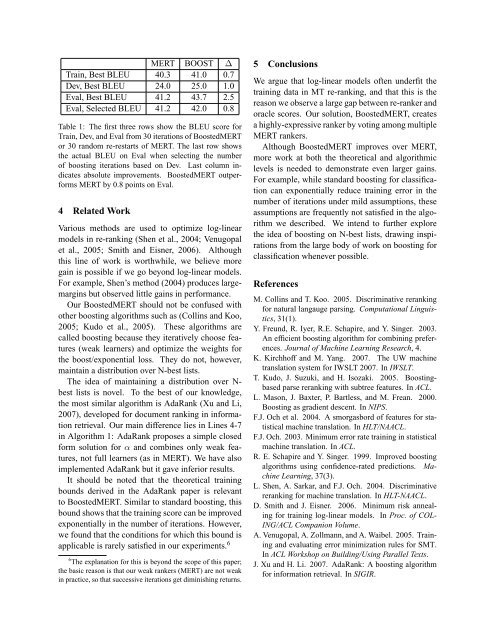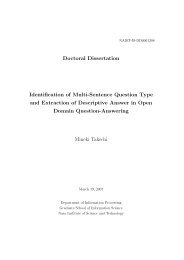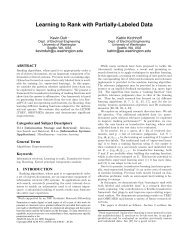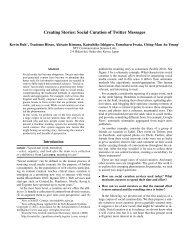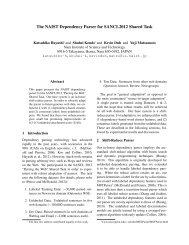Boosted Minimum Error Rate Training for N-best Re-ranking
Boosted Minimum Error Rate Training for N-best Re-ranking
Boosted Minimum Error Rate Training for N-best Re-ranking
You also want an ePaper? Increase the reach of your titles
YUMPU automatically turns print PDFs into web optimized ePapers that Google loves.
MERT BOOST ∆<br />
Train, Best BLEU 40.3 41.0 0.7<br />
Dev, Best BLEU 24.0 25.0 1.0<br />
Eval, Best BLEU 41.2 43.7 2.5<br />
Eval, Selected BLEU 41.2 42.0 0.8<br />
Table 1: The first three rows show the BLEU score <strong>for</strong><br />
Train, Dev, and Eval from 30 iterations of <strong>Boosted</strong>MERT<br />
or 30 random re-restarts of MERT. The last row shows<br />
the actual BLEU on Eval when selecting the number<br />
of boosting iterations based on Dev. Last column indicates<br />
absolute improvements. <strong>Boosted</strong>MERT outper<strong>for</strong>ms<br />
MERT by 0.8 points on Eval.<br />
4 <strong>Re</strong>lated Work<br />
Various methods are used to optimize log-linear<br />
models in re-<strong>ranking</strong> (Shen et al., 2004; Venugopal<br />
et al., 2005; Smith and Eisner, 2006). Although<br />
this line of work is worthwhile, we believe more<br />
gain is possible if we go beyond log-linear models.<br />
For example, Shen’s method (2004) produces largemargins<br />
but observed little gains in per<strong>for</strong>mance.<br />
Our <strong>Boosted</strong>MERT should not be confused with<br />
other boosting algorithms such as (Collins and Koo,<br />
2005; Kudo et al., 2005). These algorithms are<br />
called boosting because they iteratively choose features<br />
(weak learners) and optimize the weights <strong>for</strong><br />
the boost/exponential loss. They do not, however,<br />
maintain a distribution over N-<strong>best</strong> lists.<br />
The idea of maintaining a distribution over N-<br />
<strong>best</strong> lists is novel. To the <strong>best</strong> of our knowledge,<br />
the most similar algorithm is AdaRank (Xu and Li,<br />
2007), developed <strong>for</strong> document <strong>ranking</strong> in in<strong>for</strong>mation<br />
retrieval. Our main difference lies in Lines 4-7<br />
in Algorithm 1: AdaRank proposes a simple closed<br />
<strong>for</strong>m solution <strong>for</strong> α and combines only weak features,<br />
not full learners (as in MERT). We have also<br />
implemented AdaRank but it gave inferior results.<br />
It should be noted that the theoretical training<br />
bounds derived in the AdaRank paper is relevant<br />
to <strong>Boosted</strong>MERT. Similar to standard boosting, this<br />
bound shows that the training score can be improved<br />
exponentially in the number of iterations. However,<br />
we found that the conditions <strong>for</strong> which this bound is<br />
applicable is rarely satisfied in our experiments. 6<br />
6 The explanation <strong>for</strong> this is beyond the scope of this paper;<br />
the basic reason is that our weak rankers (MERT) are not weak<br />
in practice, so that successive iterations get diminishing returns.<br />
5 Conclusions<br />
We argue that log-linear models often underfit the<br />
training data in MT re-<strong>ranking</strong>, and that this is the<br />
reason we observe a large gap between re-ranker and<br />
oracle scores. Our solution, <strong>Boosted</strong>MERT, creates<br />
a highly-expressive ranker by voting among multiple<br />
MERT rankers.<br />
Although <strong>Boosted</strong>MERT improves over MERT,<br />
more work at both the theoretical and algorithmic<br />
levels is needed to demonstrate even larger gains.<br />
For example, while standard boosting <strong>for</strong> classification<br />
can exponentially reduce training error in the<br />
number of iterations under mild assumptions, these<br />
assumptions are frequently not satisfied in the algorithm<br />
we described. We intend to further explore<br />
the idea of boosting on N-<strong>best</strong> lists, drawing inspirations<br />
from the large body of work on boosting <strong>for</strong><br />
classification whenever possible.<br />
<strong>Re</strong>ferences<br />
M. Collins and T. Koo. 2005. Discriminative re<strong>ranking</strong><br />
<strong>for</strong> natural langauge parsing. Computational Linguistics,<br />
31(1).<br />
Y. Freund, R. Iyer, R.E. Schapire, and Y. Singer. 2003.<br />
An efficient boosting algorithm <strong>for</strong> combining preferences.<br />
Journal of Machine Learning <strong>Re</strong>search, 4.<br />
K. Kirchhoff and M. Yang. 2007. The UW machine<br />
translation system <strong>for</strong> IWSLT 2007. In IWSLT.<br />
T. Kudo, J. Suzuki, and H. Isozaki. 2005. Boostingbased<br />
parse re<strong>ranking</strong> with subtree features. In ACL.<br />
L. Mason, J. Baxter, P. Bartless, and M. Frean. 2000.<br />
Boosting as gradient descent. In NIPS.<br />
F.J. Och et al. 2004. A smorgasbord of features <strong>for</strong> statistical<br />
machine translation. In HLT/NAACL.<br />
F.J. Och. 2003. <strong>Minimum</strong> error rate training in statistical<br />
machine translation. In ACL.<br />
R. E. Schapire and Y. Singer. 1999. Improved boosting<br />
algorithms using confidence-rated predictions. Machine<br />
Learning, 37(3).<br />
L. Shen, A. Sarkar, and F.J. Och. 2004. Discriminative<br />
re<strong>ranking</strong> <strong>for</strong> machine translation. In HLT-NAACL.<br />
D. Smith and J. Eisner. 2006. <strong>Minimum</strong> risk annealing<br />
<strong>for</strong> training log-linear models. In Proc. of COL-<br />
ING/ACL Companion Volume.<br />
A. Venugopal, A. Zollmann, and A. Waibel. 2005. <strong>Training</strong><br />
and evaluating error minimization rules <strong>for</strong> SMT.<br />
In ACL Workshop on Building/Using Parallel Texts.<br />
J. Xu and H. Li. 2007. AdaRank: A boosting algorithm<br />
<strong>for</strong> in<strong>for</strong>mation retrieval. In SIGIR.


